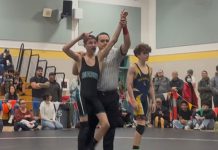DEAR EDITOR:
Nichelle Lujan Reynolds is correct (
”
If Gilroy High teachers cared, El Portal wouldn’t be needed
”
Saturday, March 08, 2003). Some of the teachers at Gilroy High
School do not care.
DEAR EDITOR:
Nichelle Lujan Reynolds is correct (“If Gilroy High teachers cared, El Portal wouldn’t be needed” Saturday, March 08, 2003). Some of the teachers at Gilroy High School do not care.
Some teachers, which are too many, prefer to go into their classrooms, shut the door, and teach the same curriculum they have taught since the start of their careers without any regard to student needs, abilities, languages, or the diverse nature of their students’ intelligences and child/adolescent brain development.
Some teachers care little for their students and constantly deride those who are less capable or who are at risk and performing below grade level. Some teachers have not bought into the federal and state mandates that hold them, their school, and district accountable of the academic success of all their students. Many thumb their noses at issues of equity, some going so far as to call it communistic, refuse to diversify their curriculum so that it meets the needs of all their students, including the most at risk, so they can succeed.
Some teachers have refused to comply with district and administrative initiatives to improve student performance such as advancing their craft of teaching by attending professional development opportunities, even those that are mandatory. They refuse to collaborate with their colleagues, to incorporate literacy strategies, to update their pedagogy by studying and incorporating best practices, the new proven curriculum development strategies, standards, essential questions, and overarching themes into their courses. Sadly, some teachers, too many, don’t believe that all students can learn. Some play worksheet roulette and show movies all day almost every day instead of doing their jobs.
Yes, Nichelle, some teachers don’t care and these teachers need to ask themselves why they are in the profession and perhaps leave. Some teachers should not be teachers.
However, Nichelle, many more teachers do care, and we work hard to develop a rich, challenging, yet scaffolded, curriculum that will help all our students succeed. We believe that all students can learn. However, we cannot perform this task alone. Teachers are not magicians who can flick a wand and dump knowledge into your brain. Research shows it doesn’t work that way.
We need the help of the students. Students must come ready to learn with their books, paper, pens, pencils, calculators, and their homework. So many don’t and it is frustrating for teachers. We can’t teach. Students must also come to school every day and arrive to class on time. They must do their best to pay attention in class and to participate in and disrupt the learning process by speaking and acting out. They must turn off their cell phones and CD players, and the girls need to put their make-up away. Here are some tips that all students can follow to do as well:
• First, go to bed at a reasonable time. Research shows that adolescents need 9 to 10 hours of sleep a night. I know this might not be possible, especially if you hold a job, but rest is important. Adolescent brains undergo many changes. The frontal lobe is undergoing what is called “selective pruning.” This is a natural process. It starts between the ages of 11 and 12 and is not completed until 18 to 20. It is also undergoing a process called “myelination.” This process will increase your ability to think abstractly. Also the cerebellum is improving its ability to coordinate your cognitive ability, which enhances the brains ability to solve math problems and increase long-term memory. However, in order for the cerebellum to complete this task adolescents must exercise and not remain sedentary in front of a computer or watch television.
• So, exercise. Physical activity strengthens the cerebellum.
• Also avoid nicotine, alcohol, and drugs, because they interfere with brain development.
So, Nichelle, let’s say you do this and you continue to have problems. Here you and your parents need to take some additional risks and responsibilities.
If you are several grade levels behind in math or reading or writing, get help.
• Ask for tutoring. Did you know that there is tutoring in the College and Career Center every day after school?
• If math or reading or writing has always plagued you, get tested. You may have a learning disability, but don’t use that as an excuse. Albert Einstein was dyslexic and had trouble reading and writing. His teachers thought he was a horrible student and stupid, but today we know different. He was a genius. He had to learn skills that allowed him to overcome his disability, and he worked hard.
Also, parents must do their part. Too many students are reaching our high schools without good study skills. Many are constantly disrespectful and disruptive of the learning process. They don’t have their homework done. Many cannot read, write, or perform simple math calculations.
A student’s home environment has a greater impact on student achievement than any teacher. Parents who read and who read to their children when they are young, even if what they read is not in English, are more likely to have students who read on grade level. Parents who require students to read every day or practice their math or spelling when their children are young are more likely to have students who succeed. Did you know that in order to learn a skill research shows that a person needs to practice that skill on at least 29 different occasions to have 70 percent proficiency? So even if your child doesn’t have homework, have them work on something they are learning. Have them review their notes, practice their spelling, the new grammar or vocabulary words for their foreign language class, read, or write. Have them do something do something that stimulates the mind and reinforces the synaptic connections involved in the learning and memory processes.
Parents need to set high goals for their children. They need to provide motivation and encouragement. They need to attend school functions, meet their children’s teachers, even in high school, and remain active in their teenager’s education. Set limits, curfews, bed times, getting exercise, eating a balanced diet. Studies show that kids need structure. If your child is having problems early in their education, get them help. Have them tested. Help them learn coping strategies.
If you are absolutely sure that the teacher is the problem, parents and students need to advocate for a change. Ask for a different teacher if you have to, but make sure you advocate for the best, not necessarily the easiest. The easiest might give you an A, but that A doesn’t mean you’ve mastered any skill or raised achievement. And don’t wait until high school. Begin advocating for the best right in kindergarten. The public school system has many excellent teachers who care and want all of their students to succeed. Find out who those good teachers are and demand that they teach you, or if you are a parent, your children. Access to a good public education is not a privilege. It is your right.
Karen Hockemeyer, Teacher, Gilroy High School
Submitted Sunday, March 9 to ed****@****ic.com
The Golden Quill is awarded occasionally for a well-written letter.












